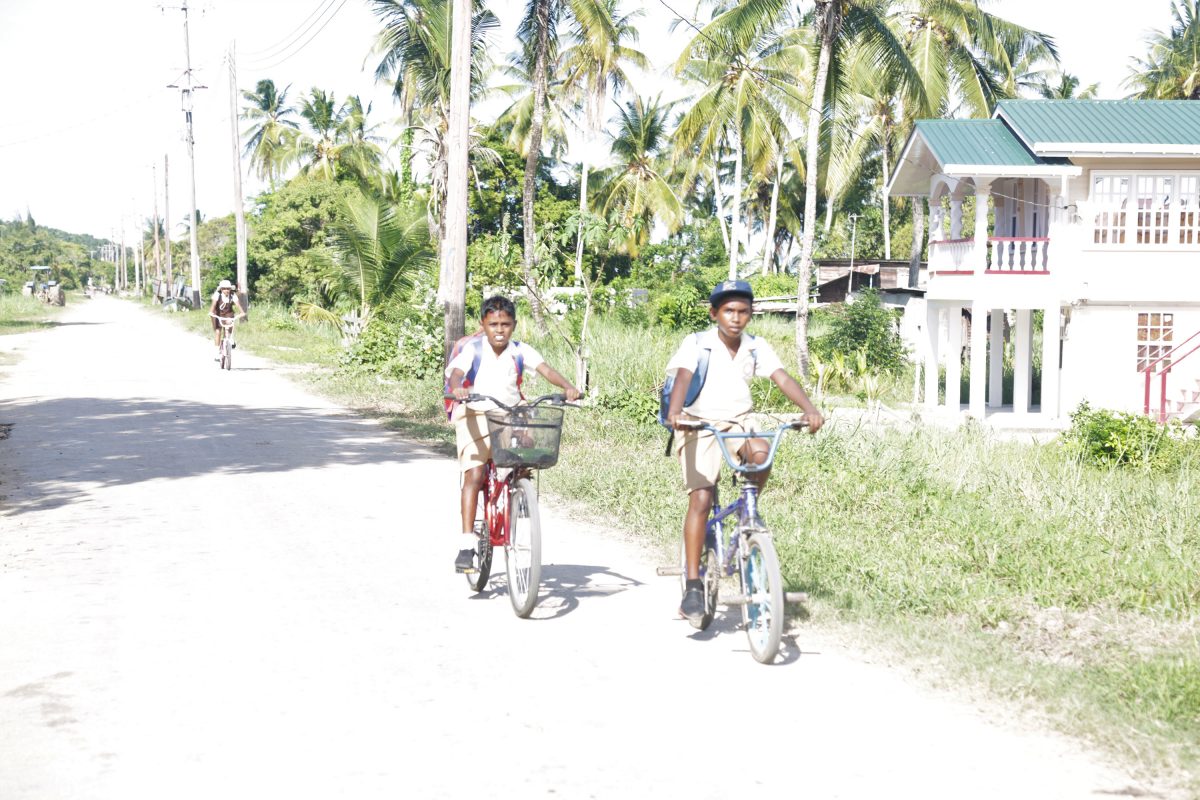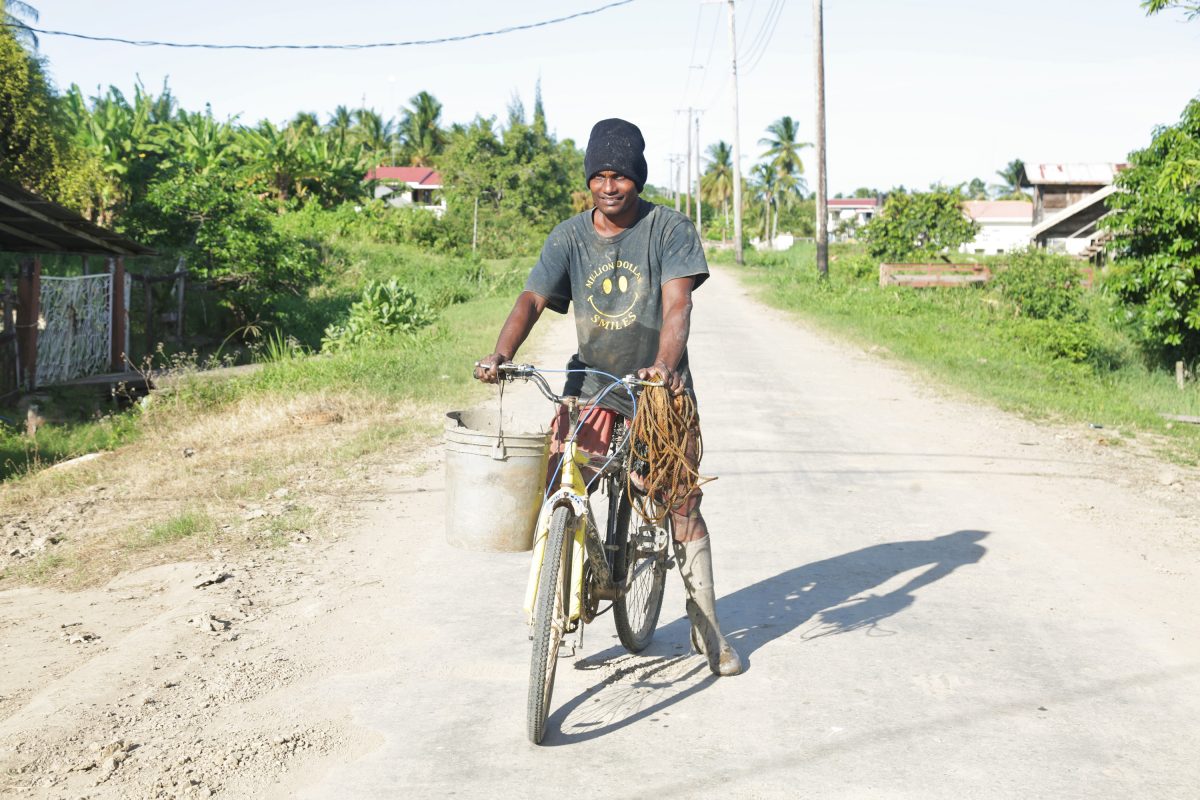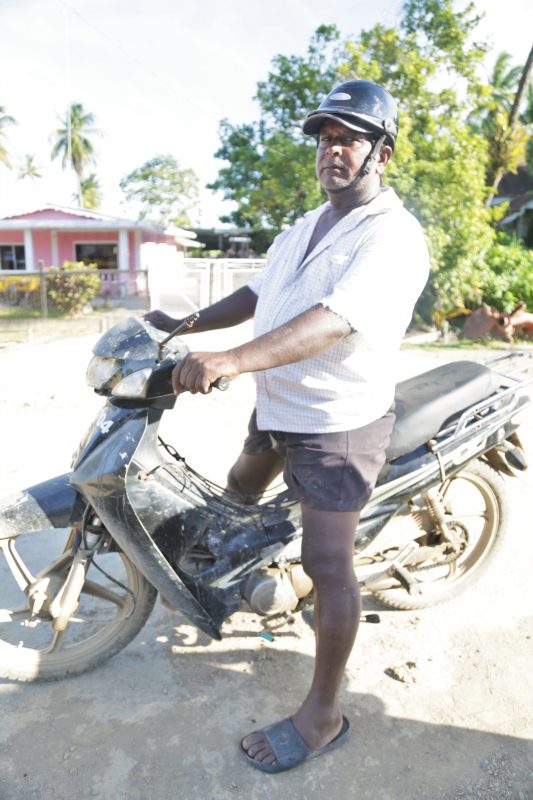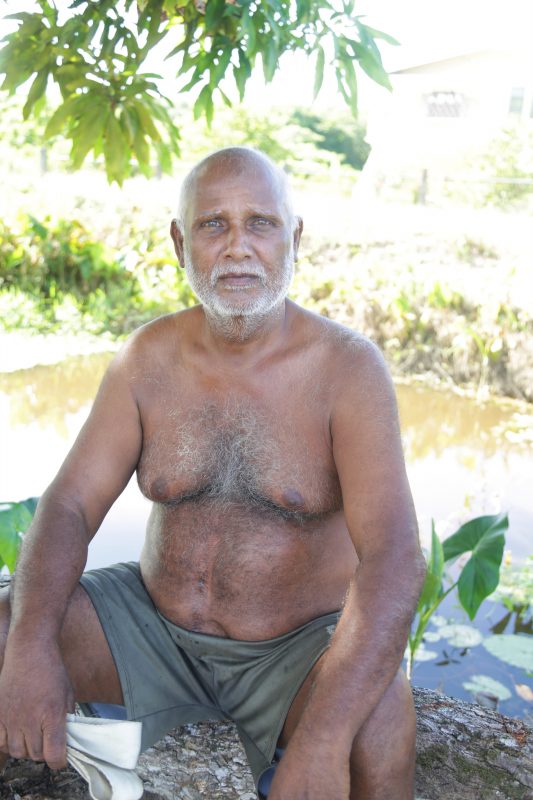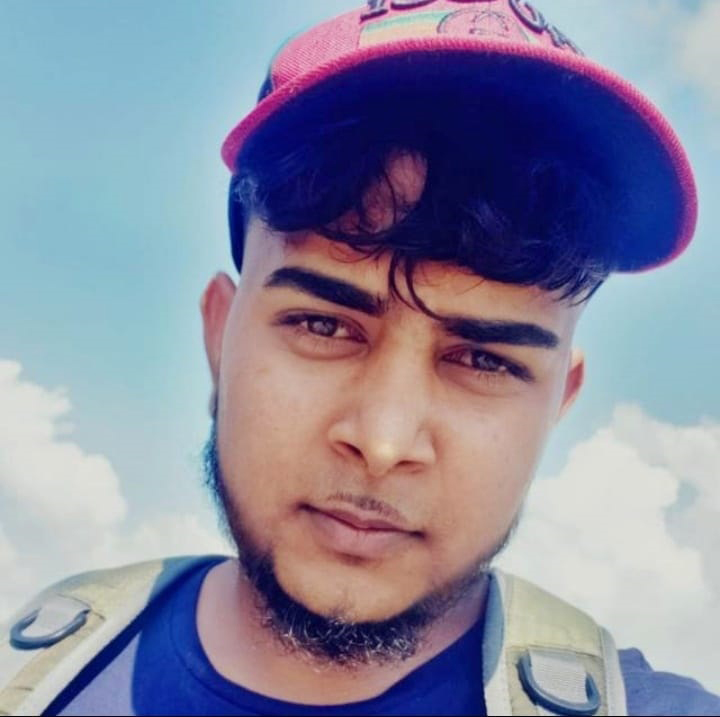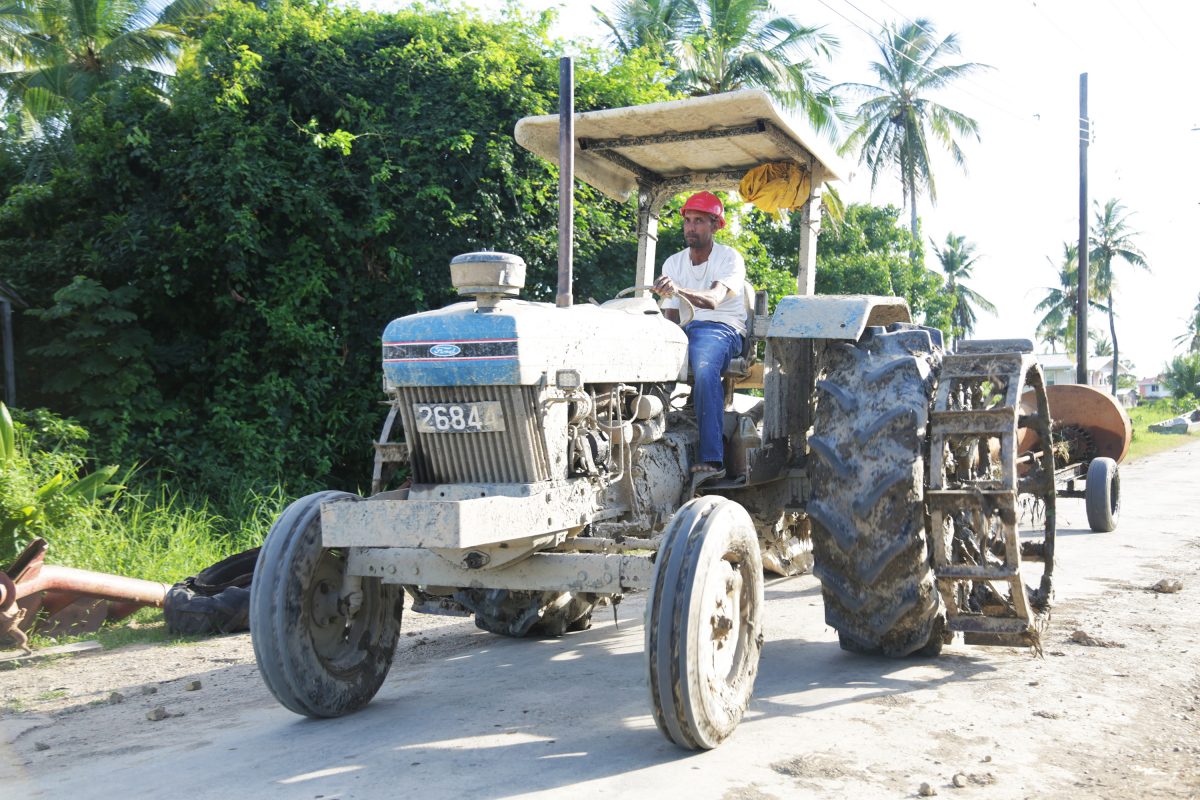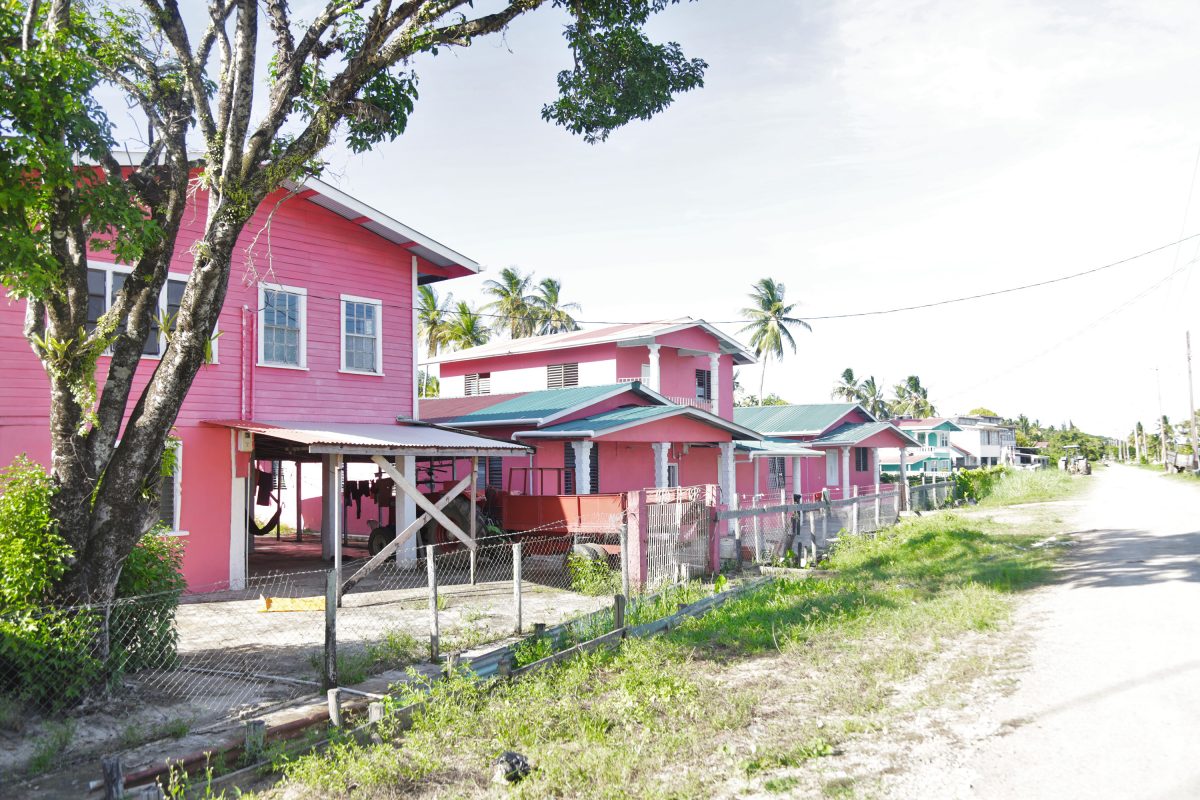Kingston is a village in Leguan, north-west of the island’s dock and bordered by Doornhag and Tewkesbury. The village is mostly rice fields that belong to the 20-plus people who call it home.
The mango trees in Kingston outnumber the population and if you visit at this time of the year, you are bound to see dozens of speckled, bird-pecked mangoes littering the ground beneath the trees.
The first house in the village is vacant, the last one is as well and throughout Kingston this is common. Nearly every other house I found during my visit was locked up because the owners have migrated. Everyone I spoke with confirmed this situation, though there was no agreement on how many people had left. The many empty houses, some overrun with bush, gave the community a desolate atmosphere.
Parwshar Timal and I sat on a log beneath his mango tree as he shared several stories, which began with the US and how developed it was; he had just returned home from his first visit to that country.
“I was in America for two month and if you see development! Everything underground, and trains running overhead,” Timal enthused. “But me nah know if this country gon come lika dah. If dis was America, man dem woulda drop wan train from hey till ah North West; train fuh guh and come. Man, you gaffo guh deh gyal. Me sisi want me left all this and guh way. Me plan on going back fuh walk. We get oil hay now and we can turn lika dah [as developed as the US] but then again, hope them nah squander out the money.”
Comparing the US to Kingston, the man said, “America got bad people tuh. You think it easy deh? Just like how abbi sit down here, if you rent wan place, the people dem nah want you come outside and watch the view and thing and car and thing ah pass. Wan bai that live deh tell me dah. Me seh bai, how dah can be if me rent this place? He seh, according to the landlord, you nah rent outside, you rent inside.” He laughed as he said this.
Timal noted that while the US is a developed country, he could never see himself living there.
“Me like hey bad, gyal. Hey, me ah do me agriculture and mind lil cow and thing,” he said. “Me gat about ten cows dem. When dey drop, yuh a geh lil milk and when dem get big, you sell am out. Me gat white chicken to, me ah mind.
“Abbi Leguan proppa nice. You lef wan cutlass out hay and nobady nah gun trouble am and any hour abbi can come outside, nah like a West Coast deh ah Tuschen deh. Watch dem rob wan gyal when she bin a come in deh. Meh wife binna tell me. Parfait Harmonie all geh bad. Wan lil bai dem bin kill and bury ah shallow grave, dah meh sisi, sister-in-law son.”
Timal lives with his second wife, who hails from the Pomeroon, and their four children. Three of the children attend Leguan Secondary and the fourth attends Richmond Hill Primary School. The man explained that his children are still of school age despite him being advanced in age because his first wife bore him no children before her passing. He then added that God knew why they never had children as he would have been the one left to support them on his own.
Timal, who was born and raised in Kingston, shared that from a tender age, he began working in the cane fields. At 12 years old, he was already working with private farmers cutting cane. He recalled working with a man for a dollar a day. Among the many different jobs he did over the years were vending clothes, vegetables and fruit, and working in the gold mines. He said he has been all over Guyana, including Kurupung, Mahdia, Mabura and Kamarang, while adding that the only place he has not been to for work is Buck Hall. He narrated stories of travelling in the Tata buses from Parika to Wales.
His oldest daughter, he boasted, is a ‘scholar’ and he added that he is encouraging her to get a job as soon as she completes her secondary education. “Once she get a job, me gon buy a motorbike and she gon teach and geh she own money,” he said. “Me tell am, don’t worry wid boyfriend and thing yet. When yuh gah yuh job, men gat to respect yuh.”
The motorcycle is one of the main modes of transportation on the island. Women and men can be seen riding them around. At present, for his three children attending secondary school, Timal pays the school bus $1,000 return. However, getting to the village requires a taxi that comes at the cost of $1,000.
Though he spoke with vigour, he said that he was not well as he had a fever and had been vomiting earlier in the day. If he felt no better, he said, he would visit the hospital in Blenheim the following day. As we were talking about him being sick, I asked about the huge scar across his stomach. Though he could not quite recall how old he was, he knew he was still rather young because his parents were still alive, and he was not yet working to take care of himself and his siblings. He recalled that he had been playing doll house with his sister and somehow swallowed a needle.
“Me ole lady [his mother] see me ah try fuh bring up [vomit] and me sisi seh, ‘Dada swallow something’ and me ole lady nah let me down. She pick me up and carry me. When me guh yah suh, dem time dat bin had wan boat call Koulette ah cross yuh any hour from this stelling fuh carry yuh ah town. If yuh sick, an anybody wan get baby and dem can’t get baby hay, the boat ah carry yuh. Government bin put ah boat deh at the stelling… dis was in Burnham days. It used to carry yuh fuh free. Dem pick up the needle on the x-ray and dah same night, me had to do operation and dem cut meh dah same night. Up to now me deh 62 year, dis year meh gon mek 62, and dis thing neva affect meh.”
Timal foresees great things for Kingston with the right kind of leadership in Guyana. Among them are streetlights for his village, concrete drains and sidewalks. He boasted of the island’s beautiful beaches that he believes can easily become a tourist attraction.
Every Sunday, he sells eggs at Parika and returns to the island in the afternoon. He does not always make a profit, as the speedboat, according to him, costs a lot. “The boat [ferry] nah wuk like before, man. Sometimes abbi nah get the boat. Sometimes you gat to ketch speedboat and dem man want $1,000. If dem ain’t gat the right load, then dem want $2,000, sometimes $2,500. Abbi island need wan brand new stelling to, really need wan stelling, really need a good, brand new stelling.
‘Best you move’
The oldest resident, 78-year-old Basmatti Moteeram sat on a bench under her house looking out with her dog lying nearby. After I called a couple times, she opened the gate. She wore hearing aids, but they were not helping as they should as I had to half-shout my questions and repeat them two or three times.
Moteeram was 15 when she left her home island, Wakenaam, and moved to Leguan with her husband. Kingston back then, she said, was nicer than it is now because more people lived in the area. She pointed out the empty houses on both sides of her fence and said that the two families have since migrated. Not only were there more families, but the families were also larger, she said, mentioning that some had as many as a dozen children. Her family with the six children she bore, she noted, was one of the smaller families in the area.
Her yard has several flowering plants and she shared that when she arrived in Kingston her mother-in-law was already in the habit of planting them. When her mother-in-law died, she kept up the tradition of planting flowers.
“You know when you get old, you can’t sit down, you got to keep moving,” Moteeram said.
She was widowed two years ago and since then, the woman said, her daughter who lives nearby insisted that she stop cooking. Her daughter provides her meals.
Living in Kingston, she said, is comfortable and she is contented with it as it is, except for wanting more neighbours.
Ricktick Singh sat at one of the tables in an almost empty rum shop with an open haversack of bangerines – a citrus fruit similar to a tangerine – in front of him. He was home on vacation from studying mechanics at the Essequibo Technical Institute on the Essequibo Coast. Sometimes he works with private farmers at different villages there also and added that if he ever did leave the island to live elsewhere it would only be for employment reasons. “Like, right now, it got shying and planting rice going on, but that’s all it got for you to do,” Singh said. “It ain’t really got anything for anyone to do here. It got a lot of people on this island who are well educated and right now they’re just sitting home. One of my friends from Success, he got like 12 subjects doing nothing right now. He’s just there going after cows. There’s only so much you can do here. What you staying here to do? Commit suicide? Best you move.”
He said he grew up in village when it had more residents, but by 2002, he said, families began migrating. Then there are those who have passed on. Among them is his mother. Her death, he shared, was not a peaceful one. She was murdered in 2002 at Albouystown by unknown men who had gone to rob his father’s business. Her killers were never arrested. Singh was raised by his grandmother, and sometimes an uncle or aunt.
One of his desires is better drainage and irrigation for the village. He showed pictures on his phone of rice growing out of cracked mud and mentioned that the farms are in need of water. However, the drains, he said, have not been cleaned in almost a year and opening the koker to flood the farms would result in the homes of several of the residents in the lower parts of the village being flooded. “The only thing I can think about them doing to help the farmers without flooding out the residents is for them to put in a conservancy for them,” he said.
Singh also spoke of Leguan’s dock. “That has been there… and gone from bad to worse. Part of it fall down, they try to fix it up back. Nothing really is happening with that. I have to travel every couple of weeks. I stay at the dorms in Essequibo but there are people who are travelling on a daily basis. The stelling is used by the businesspeople also. They have trucks loaded with rice going to town. What would happen if this stelling collapse? If you go underneath the stelling with a boat, you’ll see how bad it shaking with the [river] water. The complete thing need to do back because if you do a piece now, by next week the part that you left will go bad. Right now, the boat schedule and all; is not everyday boat. It comes from Bartica then it stop here before it go to Parika. They got the Sabanto – that used to work the Leguan-Parika route – going to Suriname now.”
On my way to see Walter Singh, I ran into Palsram (only name given). A farmer, he went straight into the meagre price being paid for a bag of paddy. “Abbi binna get market for the paddy at Venezuela and dah and all cut,” he said. “The factory man dem ah buy am and pay what dem feel like fuh pay. Dem ah pay $2,200/$2,400 fuh a bag. If we can get $3,000 or $3,500 a bag, dah would be reasonable. Things nah wuk nice at all in dis country. Everybody ah cry out, dem nah get wuk and that thing expensive but dem got to still survive; ah good thing hay ah country, people ah plant dem lil plantain and ketch dem lil fish. Me ah do all dah tuh. Me gat wan private farm. We does mind fish: patwa, hurri, yarrow, hassar and tilapia. Me gat wan kitchen garden too. You does gaffo hustle. You can’t depend on nobody. You gat to try in dis life. Is time fuh a change. Abbi need a new president. This president like de other president, sheer promises.”
He was headed nearby to the shop to get a pesticide he called, ‘tornado’. He said it would last for two months before he would have to buy more.
Walter Singh sat in the quiet of his verandah. He wore glasses that covered his eyes. One of his eyes was injured and he is now completely blind in that eye. He also suffers from glaucoma but can still see out of the other eye. He doesn’t do any work that requires heavy lifting and has employed labourers to work for him.
“As a little boy growing up, this village was more populated. This place had more than 40 persons living here. All the children used to go to Richmond Hill Primary School; even the school was more populated then. After primary school I start to work along with my father in the backdam,” he said.
Asked whether he knew how long the village has been in existence, Singh said he heard from his father that the first residents lived further back in an area called ‘Housan’ before they settled in Kingston. He said he loves Leguan and added that the people who live in Kingston and on the entire island do not work for much money, but they are happy.
He, too, spoke of his dilemma as a rice farmer. “The price for paddy is very low. You cope with this price just because if you get an amount of paddy, is a safe crop but is like a gamble. If you lose one crop, it take you couple crop to catch back. At present, people just shy baby rice… they just keep the water down for the rice grow good. And now that the weather come out good, people getting problem with water already. If this rain nah fall in the next week or suh, I don’t know what gon happen; they might lose them rice.”
Asked about residents in the low-lying area being flooded when the koker is opened to allow water into the farms, Singh said, “Dem got protection that can protect all them house area from flooding but the council don’t care to do these things. It got a trench at the back there, that carry a culvert. It got one at the front here, that carry a culvert and it got a next culvert that carrying across water at that section of the houses. If all dem things got door on it, whenever water open at the backdam, water can’t get into their yards. They need self-acting door, the culverts dem.”
Returning to rice, the farmer said that paddy should not be less than $3,000 a bag. He mentioned that he knew of places along the Essequibo Coast where a bag of paddy costs $2,900 or $3,000.
